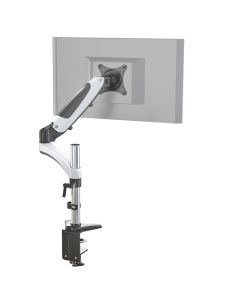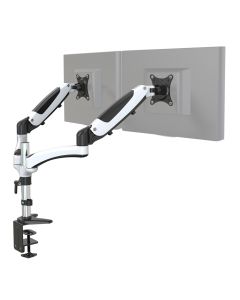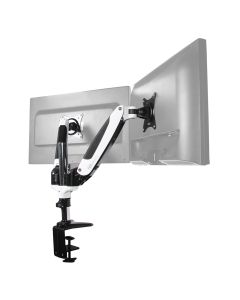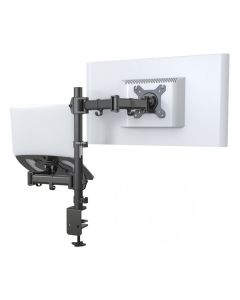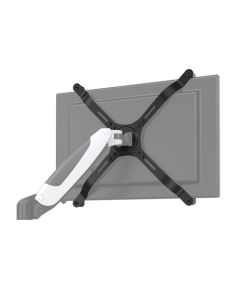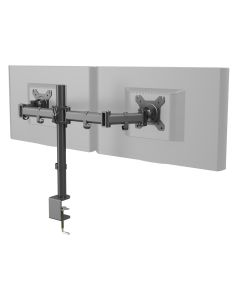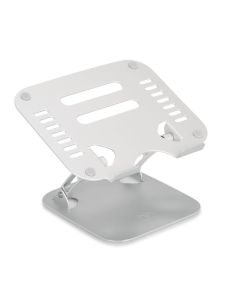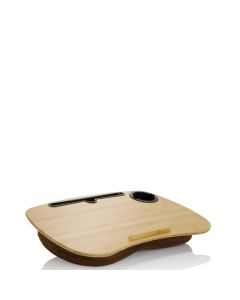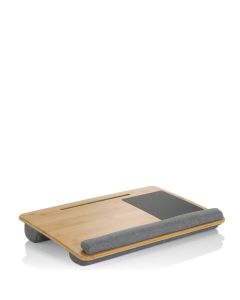Disorganised desk equals disorganised mind?
Order and disorder on your desk affects your productivity. read on for what the experts have to say and studies prove.
There is a famous picture of Albert Einstein’s desk, taken on the day of his death, the 15th of April 1955. It shows the desk of the father of relativity. The desk on which the renowned scientist developed his theory is pure chaos. Einstein’s office chair marks the centre of various concentric circles of piles of paper, piles of books and notebooks. The shelves in the background appear to have been filled in a frenzy, that is, as a matter of necessity rather than as a means of organisation. The blackboard behind Einstein’s office chair is scrawled with white chalk formulas and notes. Thus, the popular assumption is that a brilliant mind needs a creative environment to function properly. A study by a psychologist from the University of Minnesota appears to support this thesis. However, the majority of bosses do not share the opinion that disorder creates a productive work environment. They regard the condition of an employee’s desk as a business card that reflects the quality of their services. Studies also support the theory that notoriously untidy employees are disorganised, lazy and generally weak of character. The reality is that the best work environment is somewhere in the middle.
The first theory: Creativity is born of chaos
here are many examples of the assumption that creative minds work in a (shall we say) equally ‘creative’ environment. A video by Steve Jobs shows the Apple mastermind’s desk to bear a remarkable resemblance Einstein’s. Apart from the giant iMac, that is. Even the bookshelves behind Jobs are organised in a disorderly Einsteinian fashion. Jon Stewart, the mind behind the US ‘Daily Show’ and a comedian, actor, author, director, also likes to keep his office wild and colourful. He has a notebook in the middle of his desk, a computer on his left and a miscellaneous assortment of lolly jars, construction helmets, soap dispensers and soft drink cans sitting on random piles of paper. Karl Lagerfeld appears to like a colourful work environment as well, although his is slightly more organised than that of Stewart. Lagerfeld keeps metre-high piles of colourful fabrics in his office. These are meticulously sorted and divided in clearly marked shelves.
Of course, there are also counterexamples to this trend. John Lennon did not need more than a notepad, a pen and a glass of wine for his work. Lennon kept a guitar case, a lamp, a chair and an amplifier behind his worktable. This orderly work environment created a sense of calm and epitomised the quiet life. On the contrary, Lennon’s wife, Yoko Ono, stayed true to the artistic stereotype; unlike Lennon, she littered her desk with note pads, books and loose-leaf paper.
A study by a professor from the University of Minnesota suggests that people’s workspaces are as different as their owners. In fact, Professor Kathleen Vohs aimed to show that a chaotic work environment frees the creativity of the spirit. In an experiment, the psychologist asked a group of subjects to find non-sport-related uses for table tennis balls. Half the subjects completed this task in a whitewashed, organised office space. The other half carried out their part of the experiment in a messy office. The results were clear. Whilst each group provided approximately the same number of suggestions, the suggestions of the group from the disorderly office were significantly more creative. This experiment and others led Professor Vohs to the conclusion that an unconventional, disorderly workplace leads to a less conventional work output.
The reason for this is an interesting psychological phenomenon: people generally seek order. If there is no time to create order because other tasks are more pressing or the disorder is simply too large to deal with, the brain seeks the fastest possible solution to the problem at hand. Our mind takes neural shortcuts, and hence, a chaotic environment inspires us to find unconventional solutions to problems.
The second theory: Disorder kills productivity
Kathleen Vohs Studien ergaben allerdings auch eine andere Erkenntnis. Mit weiteren Studien fand sie heraus, dass unordentliche Arbeiter geiziger sind als ordentliche und sich oft auch ungesünder ernähren als ihre ordnungsliebenden Kollegen. Das spielt natürlich wieder denjenigen in die Karten, die immer schon vermutet haben, dass ein unordentliches Arbeitsumfeld nur das Symptom einer Charakterschwäche von vielen ist. Vor allem in Vorgesetzten-Kreisen hält sich diese Faustregel beständig, oft gefolgt von Feststellungen wie: „…und im Übrigen verbringt ein unordentlicher Mensch mehr Zeit mit Suchen als mit Arbeiten“. Auch da scheint Wahres dran zu sein, wie eine Studie des Fraunhofer-Instituts für Produktionstechnik und Automatisierung zeigt.
Dessen Untersuchungen förderten zutage, dass Chaos am Arbeitsplatz tatsächlich jede Menge Arbeitszeit kostet. Die offizielle Begründung dürfte keinen überraschen: An unordentlichen Schreibtischen wird mehr Zeit für Suchen, fehlende oder überflüssige Arbeitsmaterialien fällig als an aufgeräumten. Übrigens gilt das auch für ein chaotisches Dateiablagesystem auf dem Computer. Bemerkenswert ist allerdings die Summe der so vergeudeten Arbeitszeit: Circa 70 Arbeitstage im Jahr gehen fürs Suchen an unaufgeräumten Schreibtischen im Durchschnitt drauf – das Institut errechnet daraus 10 Prozent der Gesamtarbeitszeit.
The middle ground
The ideal is probably somewhere in between the Einsteinian workspace and the OCD-inspired open plan office. Of course, not every employee who works beside piles of loose-leaf paper and thousands of old post-it notes is a creative genius. On the other hand, the most ordered workspace can be the haunt of an uninspiring and inefficient worker. It should also be clear that moderation is the key. If a state of disorder is so developed that it cripples your productivity, you will have to change your ways. Then again, organised people should not spend more time organising their desk than doing work. Experts recommend cleaning the office space at regular intervals as this clears both the desk and the mind of clutter.
PLEASE SEE RELEVANT ARTICLES ON ORGANISING YOUR OFFICE SPACE IN THE HJH-OFFICE.CO.UK CUSTOMER GUIDE:
- Personal Touches to the Office
- Office plants: from green Thumbs to good Eye Health
- Cable Spaghetti — Tips and Tricks for the Office and Home

